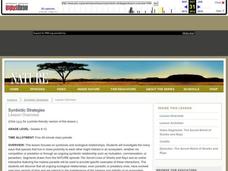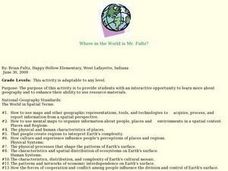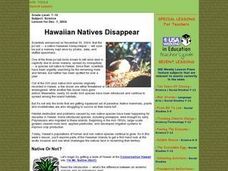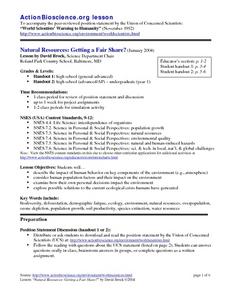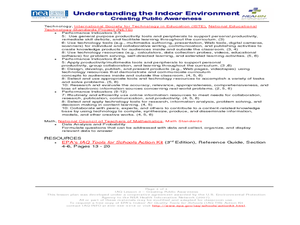Curated OER
Symbiotic Strategies
Students explore the different interspecies relationships namely mutualistic, commensal and parasitic. For this ecology lesson, students investigate an ecosystem disrupted by humans. They formulate an action plan to save it and present...
Curated OER
Air: Air Quality Picture Project
High schoolers recognize which activities contribute to poor air quality and which contribute to good air quality. They discover how air quality is measured, and come up with ways that humans can have a positive affect on air quality.
Curated OER
Acid Rain
Students investigate acid rain. In this environmental lesson, students participate in an experiment using litmus paper and various liquids and then test the acidity of the liquids. Students identify reasons why acid is harmful to the...
Curated OER
How Does the Loss of Ozone Affect Our Climate
Students explore the greenhouse effect and what it does to the environment. They discuss if and how human behavior contributes to global warming and test natural materials for carbon content.
Curated OER
Where Do All the Toxins Go?
Young scholars demonstrate how chemicals accumulate in fish fat. They study path ways of toxins in the fish's body and ways to prepare fish to avoid consuming the toxins. They examine U.S. and Canada regulations to protect the environment.
Curated OER
Salmon Scavenger Hunt
Students go on a salmon scavenger hunt to find out about threats to salmon populations. They gather information about some of the reasons wild salmon have gone from such incredible abundance to relative scarcity, and about some of the...
Curated OER
Energy Efficient Buildings
Seventh graders create plans for an energy efficient addition to the school. They work in small groups with each group having responsibility for examining one aspect of the problem. They create working diagrams and a model of their...
Curated OER
Water Wars: Responsibility in the Age of Globalization
Learners explore the concept of water as a resource and as a human right. For this conservation lesson, students record and chart personal water usage and consumption then brainstorm ways in which to responsibly reduce water waste.
Curated OER
Where in the World is Mr. Fultz?
Students use maps and other geographic resources to learn about their world while problem solving. They read clues each day and use classroom resources to narrow down where the prize is located.
Curated OER
Remote Sensing
Students study the effects of global warming on specific organisms. They research the possible problems global warming is causing.
Curated OER
Hawaiian Natives Disappear
Students explore parts of the Hawaiian Islands to get a examine the exotic invasion, and see what challenges the natives face in reclaiming their territory. They identify the changes in the environment that have been the hardest on the...
Curated OER
You and the Law -- Beating the Odds
Students examine the rate of institutional racism in the United States. Individually, they write in their journals about how they can make better choices and increase their self-esteem. Using historical documents, they identify the...
Curated OER
Look At Those Leaves!
Students observe leaves and their attributes and group them accordingly. In this science observation instructional activity students gather leaves and use them to become more familiar with seasonal changes and the cycles of our...
Curated OER
Natural Resources: Getting a Fair Share?
Students explore the impact of human behavior on key components of the environment, examine how theirn own personal decisions have added to the problem, and explore possible solutions to the current ecological crisis.
Curated OER
Burn, Baby Burn (Or Not)
Physics learners apply the concepts of fluid pressure input and output to firefighting. Divide your class into small groups and give them each a few cards that list nozzle type, hose length, hose size, and structure dimensions, They are...
Curated OER
Consequences of Garbage
First graders consider the problem of too much garbage in America. In this garbage use lesson, 1st graders discuss ways to decrease garbage in the United States and complete a coloring sheet.
SRI International
The Water Crisis
Water, water, everywhere, right? Wrong. Learners assess their own knowledge of water availability on Earth. Then, through a reading, a teacher-led presentation, and an activity, pupils learn about the importance of available clean...
UAF Geophysical Institute
System Interactions: The Lorax and the Truffula Tree
If the Lorax were to write a letter, what would he write? Introduce your class to systems and feedback loops through the whimsical stylings of Dr. Seuss. Learners take on the Lorax's point of view to write a letter, among other activities.
WE Charity
High School–Module 4: Energy and Housing
What features make a home energy-efficient? Pupils attempt to answer the question with the fourth lesson from the five-part WE Are Innovators—High School Modules set. Scholars learn how certain building materials help save energy. Using...
Salt River Project
How Do We Clean Polluted Water?
How do we clean up oil spills and other pollutants in the water? Explore water treatment strategies with a set of environmental science experiments. Groups remove oil from water, work with wastewater treatment, and perform a water...
Curated OER
Creating Public Awareness - Indoor Air Quality
Students design a poster about indoor air quality. In this indoor air quality lesson, students make a billboard that tells the occupants of a building about at least one air quality problem.
Curated OER
Buffalo Gone: Appreciating Natural Resources
Students develop numercy skills by studying the number of bison before and after the arrival of European settlers in Canada. They examine the affect of the reduction in the number of bison on Native families.
Curated OER
Ratification & Review
Learners work with their parents to decorate strips of construction paper in primary colors to represent one family member per link on the chain. They sing a gathering song and all share their family chains. They read the story of the...
Curated OER
Life Systems- Interacting Organisms
Participate in a life science unit that examines the relationships of living organisms to each other and to their environment as well as the student's role in the cycle of life. Through hands-on activities, research, and scientific...


